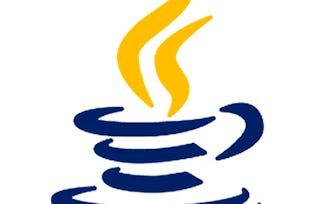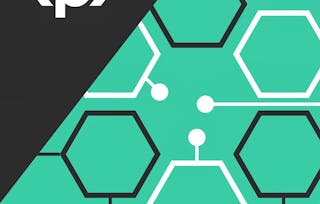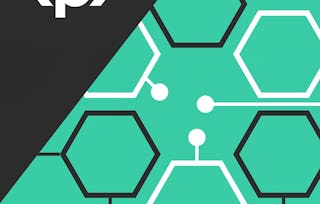Dieser Kurs bietet eine Einführung in die Sprache Java und die objektorientierte Programmierung, einschließlich eines Überblicks über die Java-Syntax und die Unterschiede zu einer Sprache wie Python. Die Teilnehmer lernen, wie man eigene Java-Klassen und -Methoden schreibt und wie man seinen Code mit Unit-Tests und testorientierter Entwicklung testet. Zu den Themen gehören grundlegende Datenstrukturen wie Arrays und ArrayLists und das Überladen von Methoden.

Einführung in die Java- und die objektorientierte Programmierung

Einführung in die Java- und die objektorientierte Programmierung
Dieser Kurs ist Teil von Spezialisierung für Einführung in die Programmierung mit Python und Java

Dozent: Brandon Krakowsky
42.180 bereits angemeldet
Bei enthalten
332 reviews
Empfohlene Erfahrung
Was Sie lernen werden
Identifizieren Sie die Kernaspekte der objektorientierten Programmierung und die Funktionen der Sprache Java.
Verwenden Sie Eclipse zum Schreiben und Ausführen von Java-Code.
Entwickeln Sie Programme, die Java-Sammlungen verwenden, und wenden Sie zentrale Konzepte der objektorientierten Programmierung mit Klassen, Polymorphismus und Methodenüberladung an.
Testen Sie Code, indem Sie die Prinzipien der testgesteuerten Entwicklung unter Verwendung des Java Unit Testing Frameworks anwenden.
Kompetenzen, die Sie erwerben
- Kategorie: Objektorientierter Entwurf
- Kategorie: Java Programmierung
- Kategorie: Software-Tests
- Kategorie: Anwendungsentwicklung
- Kategorie: Java
- Kategorie: Objektorientierte Programmierung (OOP)
- Kategorie: Einheitstest
- Kategorie: Grundsätze der Programmierung
- Kategorie: Computerprogrammierung
- Kategorie: Datenstrukturen
- Kategorie: Testgetriebene Entwicklung (TDD)
Wichtige Details

Zu Ihrem LinkedIn-Profil hinzufügen
7 Aufgaben
Erfahren Sie, wie Mitarbeiter führender Unternehmen gefragte Kompetenzen erwerben.

Erweitern Sie Ihre Fachkenntnisse
- Lernen Sie neue Konzepte von Branchenexperten
- Gewinnen Sie ein Grundverständnis bestimmter Themen oder Tools
- Erwerben Sie berufsrelevante Kompetenzen durch praktische Projekte
- Erwerben Sie ein Berufszertifikat zur Vorlage

In diesem Kurs gibt es 3 Module
Willkommen bei Java! Dieses erste Modul bietet eine Einführung in die Sprache Java und die objektorientierte Programmierung. Es enthält einen Überblick über die Java-Syntax, insbesondere darüber, wie sie sich von einer Sprache wie Python unterscheidet. Zu den Themen gehören Variablen und Datentypen, Schleifen und Bedingungen, Drucken auf der Konsole, Scannen nach Benutzereingaben und Code-Dokumentation. Dieses Modul erklärt auch die Struktur und das Innenleben einer Java-Klasse und zeigt Ihnen, wie Sie Ihre eigenen benutzerdefinierten Klassen und Methoden definieren können.
Das ist alles enthalten
38 Videos10 Lektüren3 Aufgaben2 App-Elemente
In diesem Modul lernen Sie, wie Sie Ihren Code testen können, damit er funktioniert. Das geht am besten, indem Sie eine Reihe von Unit-Tests schreiben, die Sie jederzeit gegen Ihr Programm laufen lassen können. In diesem Modul werden wir lernen, wie man Unit-Tests in Java durchführt und warum wir das tun sollten. Außerdem lernen wir alles über Java Arrays, d.h. Sammlungen von Elementen, und ArrayLists, die ähnlich wie Arrays funktionieren, aber viel flexibler sind. Sie funktionieren genauso wie Listen in Python. ArrayLists sind Teil des größeren Collections Framework von Java, auf das wir im Laufe dieses Kurses immer wieder Bezug nehmen werden.
Das ist alles enthalten
23 Videos5 Lektüren2 Aufgaben2 App-Elemente
Bislang haben wir Variablen in unseren Java-Klassen als Instanzvariablen definiert. Instanzvariablen sind lediglich Variablen, die innerhalb einer Klasse definiert sind, und jede Instanz einer Klasse kann einen anderen Wert für eine Instanzvariable haben. In diesem Modul werden wir uns mit der Definition statischer Variablen in unseren Java-Klassen beschäftigen. Statische Variablen werden ebenfalls als Variablen innerhalb einer Klasse definiert, allerdings mit dem Schlüsselwort 'static'. Statische Variablen haben für jede Instanz einer Klasse den gleichen Wert. Tatsächlich müssen Sie nicht einmal eine Instanz einer Klasse erstellen, um eine statische Variable zu verwenden! Wir werden uns auch mit statischen Methoden befassen. Und genau wie bei statischen Variablen müssen Sie keine Instanz einer Klasse erstellen, um eine statische Methode zu verwenden oder aufzurufen. In diesem Modul werden wir auch die Polymorphie einführen, d.h. das Überladen und Überschreiben. Wir werden uns auf das Überladen konzentrieren, d.h. auf zwei oder mehr Methoden mit demselben Namen in derselben Klasse.
Das ist alles enthalten
21 Videos2 Lektüren2 Aufgaben1 App-Element
Erwerben Sie ein Karrierezertifikat.
Fügen Sie dieses Zeugnis Ihrem LinkedIn-Profil, Lebenslauf oder CV hinzu. Teilen Sie sie in Social Media und in Ihrer Leistungsbeurteilung.
Dozent

Mehr von Softwareentwicklung entdecken
 Status: Kostenloser Testzeitraum
Status: Kostenloser Testzeitraum Status: Kostenloser Testzeitraum
Status: Kostenloser Testzeitraum Status: Kostenloser Testzeitraum
Status: Kostenloser Testzeitraum
Birla Institute of Technology & Science, Pilani
Warum entscheiden sich Menschen für Coursera für ihre Karriere?

Felipe M.

Jennifer J.

Larry W.

Chaitanya A.
Bewertungen von Lernenden
- 5 stars
67,77 %
- 4 stars
21,08 %
- 3 stars
5,42 %
- 2 stars
1,80 %
- 1 star
3,91 %
Zeigt 3 von 332 an
Geprüft am 26. Juni 2023
The lecturer was excellent. his teaching style is very smart and understanable to everyone,and explanation part is also great. wish to learn from him again.
Geprüft am 2. Nov. 2022
Amazing course and really , really usefull for professional coding , thank you so much for providing me financial aid really loved the experience
Geprüft am 28. Mai 2022
A 10 out of 10 course. Very well designed and the assignments are great for enhancing learning and understanding.

Neue Karrieremöglichkeiten mit Coursera Plus
Unbegrenzter Zugang zu 10,000+ Weltklasse-Kursen, praktischen Projekten und berufsqualifizierenden Zertifikatsprogrammen - alles in Ihrem Abonnement enthalten
Bringen Sie Ihre Karriere mit einem Online-Abschluss voran.
Erwerben Sie einen Abschluss von erstklassigen Universitäten – 100 % online
Schließen Sie sich mehr als 3.400 Unternehmen in aller Welt an, die sich für Coursera for Business entschieden haben.
Schulen Sie Ihre Mitarbeiter*innen, um sich in der digitalen Wirtschaft zu behaupten.
Häufig gestellte Fragen
Die einzige Mathematik, die Sie für diese Specializations benötigen, ist Arithmetik und grundlegende Konzepte der Logik.
Wenn Ihnen dieser Kurs gefallen hat, empfehlen wir Ihnen die Kurse 1, 2 und 4 der Reihe!
Wenn Sie über die Grundlagen der Programmierung hinaus die Grundlagen der Informatik erlernen möchten, sollten Sie in Erwägung ziehen, sich für den Master of Computer and Information and Technology (MCIT) an der University of Pennsylvania zu bewerben, ein Informatik-Masterprogramm der Ivy League für Personen ohne Informatikhintergrund. Für eine Erfahrung auf dem Campus, erkunden Sie hier. Wenn Sie eine Online-Umgebung bevorzugen, bewerben Sie sich bei MCIT Online. Die Vorlesungen dieser Reihe werden nämlich auch im Online-Studiengang verwendet! Das Specializations-Zertifikat wird von der Zulassungskommission positiv bewertet, also erwähnen Sie es unbedingt bei Ihrer Bewerbung.
Um Zugang zu den Kursmaterialien und Aufgaben zu erhalten und um ein Zertifikat zu erwerben, müssen Sie die Zertifikatserfahrung erwerben, wenn Sie sich für einen Kurs anmelden. Sie können stattdessen eine kostenlose Testversion ausprobieren oder finanzielle Unterstützung beantragen. Der Kurs kann stattdessen die Option "Vollständiger Kurs, kein Zertifikat" anbieten. Mit dieser Option können Sie alle Kursmaterialien einsehen, die erforderlichen Bewertungen abgeben und eine Abschlussnote erhalten. Dies bedeutet auch, dass Sie kein Zertifikat erwerben können.
Weitere Fragen
Finanzielle Unterstützung verfügbar,

